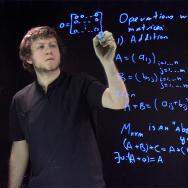For more than a decade, Thursday mornings have been sacred for a devoted group of students who found each other—and stay connected—through a class at the University of Chicago Graham School.
“Everyone in my life knows that Thursday mornings are my time,” said Karyn Glass, 60, the youngest of these lifelong learners, whose average age hovers in the 70s. “We always joked that we planned our lives around Thursdays, but it’s like my North Star. What would you do without your Thursday morning class?”
In 2006, Glass and her classmates began the Basic Program of Liberal Education for Adults—a four-year, non-credit program based on reading and discussing the Great Books. Like most older adults who enroll, many of them wanted to take more classes after graduation. Unlike most of the groups, though—they wanted to continue learning together.
“Several of them have dropped, some have moved, a couple have died, but a core remained,” said Katia Mitova, who has taught at the Graham School since 1998.
Six of the original group of 20 students are currently taking part in their first Zoom course taught by Mitova, entitled “Dictatorship: Three Latin American Novels.” Despite the obstacles created by the COVID-19 pandemic and remote learning, this spring’s 9:30 a.m. Thursday class is one that Glass couldn’t miss.
“I always thought of it as my lifesaver. It’s the only time I didn’t think about the outside world,” Glass said. “I’m hoping that this doesn’t go on forever, and we can go back to class.”
‘She was the ideal student at 90 years old’
One thing missing this spring is original class member Nancy Brandt, who passed away last December at age 90. The “den mother” of the group, Brandt polled her classmates on what texts to study, helped make connections with Graham School staff and instructors, and even organized post-quarter parties.
“You know a group functions better when it has an axis,” said Mitova, “and in this group, it was Nancy Brandt.”
So beloved was Brandt that Graham School staff called her class “Nancy’s Group.” Fittingly, Brandt even helped plan this year’s curriculum for the program.
“Nancy was the glue, but I hope we stay stuck together,” said retired attorney Walt Kurczewski, 77, one of the group’s original members, who is enrolled in this quarter’s class. “She was so focused at 90 years old. She had this way of sort of tilting her head, and you knew what she was going to say next was going to be important.
“She was just unbelievable, and she was a role model—at least she was mine.”
Brandt was heavily involved in community politics, her church in Lincoln Park, the League of Women Voters of Chicago, as well as countless other efforts in Chicago. She was one of Mitova’s star pupils.
“It’s very difficult to think of a better student,” said Mitova, who taught Brandt in a course on Russian novelist Vladimir Nabokov last fall. “She would come to class with specific passages marked and there was no wasted time with her in class. She was the ideal student at 90 years old.”
As it turns out, Brandt was a student in one of Nabokov’s classes in the 1950s at Cornell University. “She was not impressed by him then,” Mitova said of Brandt’s take on the author of Lolita. “But then, when she finally started reading his works in the Basic Program, she told me she felt she had lost 67 years of her life.”
The Basic Program: Filling the gaps in education
Although the Graham School dates to the University’s founding, the Basic Program was established in 1946, the vision of former UChicago President Robert M. Hutchins and faculty member Mortimer J. Adler. The 10-week discussion-based classes cover texts spanning literature, philosophy and history—from Homer to Shakespeare, Plato to Hobbes to Kant to Nietzsche, Herodotus to Melville to Virgina Woolf, to name a few.
A radio advertisement describing “no papers and no tests” sold Kurczewski on enrolling in the program. He liked the classes so much that he used to fly back from Tucson, Arizona during the winter just to attend.
“People will joke about keeping the synapses firing and getting your mind working, but there’s really something to that,” said Kurczewski. “I enjoy the interplay of the classmates and the instructors, who are so good. We bring up points, we have disagreements, and we learn from each other, and the learning just goes on and on—and it makes you feel younger.”
Glass laughs about the fact that she’s the “baby” of the group, but when she enrolled in the Basic Program 14 years ago at age 46, she was a bit intimidated.
“I had heard about it for many years, but I was afraid of it—I was envisioning it was full of retired English professors, and here I was, a history graduate and a lawyer who would not be up to the challenge,” said Glass, who works as an attorney with the Bluhm Legal Clinic at Northwestern University. “But it turned out to be the best decision I have ever made about anything I’ve ever been involved in.”
Adapting to technology
Remote learning this quarter has presented its own set of obstacles, but the group is making it work.
“We’re all learning. Six weeks ago, I didn’t know the word ‘Zoom,’” said Bill Greenfield, a retired family physician and part of “Nancy’s group.” After updating browsers and software and installing a webcam, the 75-year-old feels happy to be back in class.
“I’m being dragged into the 21st century,” he said, “but this will work.”
Mitova reminds her class that Brandt adapted quickly to online learning in her Russian literature class last fall. “I always use her as an example for the class—if Nancy could study online, all of you should be able to do it,” she said. “They say, ‘Yeah, but Nancy could do anything!’”
Glass, Kurczewski and Greenfield all agree that for as long as they can, they’ll continue to learn together on Thursday mornings—and they’ll always remember their dear friend Nancy.
“It was so glorious from the get-go, and this particular group just bonded in such a way,” Glass said. “I always felt like I walked in on a magic year, to be with like-minded people in their devotion to continuing education just for the sake of the enjoyment of learning more.
“To know that this can keep going, that it will always be there … it’s just an extraordinary gift.”

